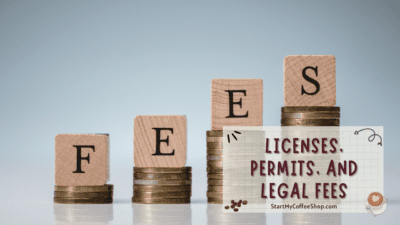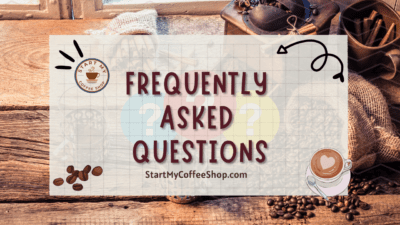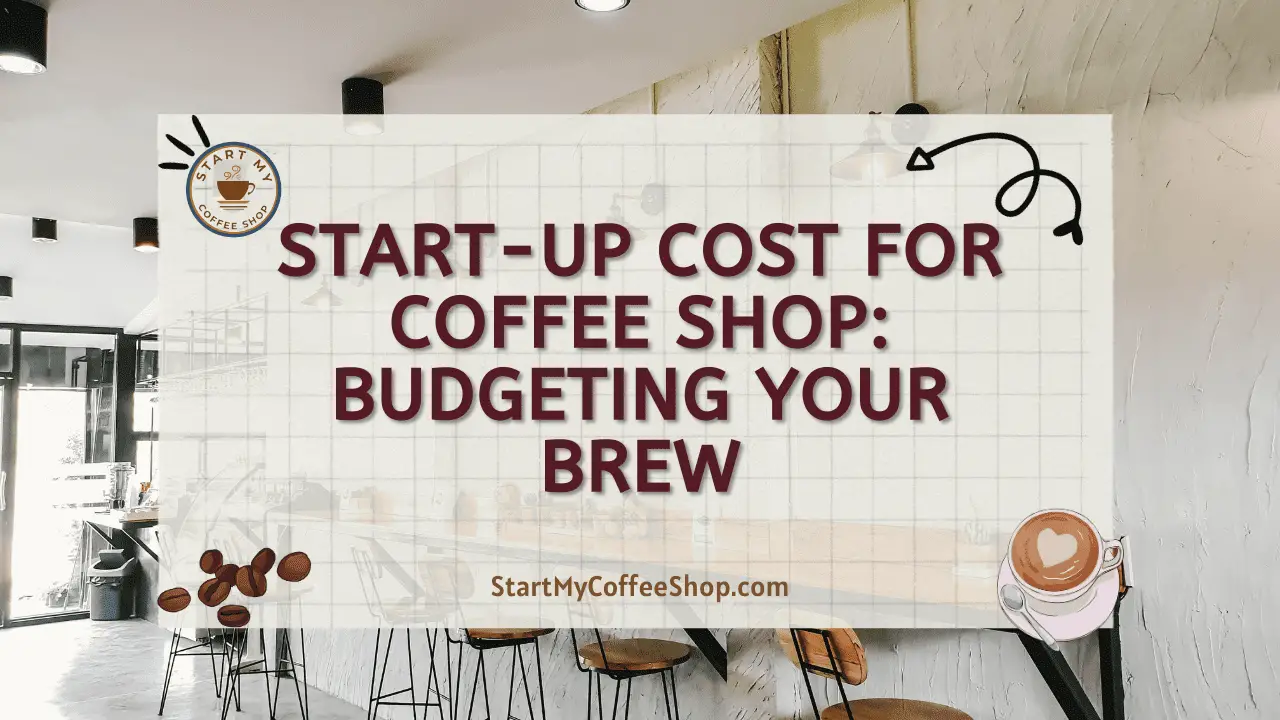Opening a coffee shop can be exciting and overwhelming. It offers an opportunity to create a cozy space where people can enjoy a cup of their favorite brew and connect with others. But like any business, starting a coffee shop requires careful planning, and one crucial aspect to consider is the start-up costs involved.
Opening a coffee shop requires careful budgeting. Costs include location, renovations, equipment, licenses, inventory, staffing, marketing, and ongoing expenses. Plan wisely to create a great and long-lasting venture.
In this article, I will delve into the various expenses you need to consider when launching your coffee shop.
Location and Lease
One of the key considerations is striking a balance between foot traffic and cost. While a bustling area with heavy pedestrian flow can attract a steady stream of potential customers, it usually comes with a higher price tag. This can be advantageous for your business as it exposes your coffee shop to a larger audience, but it’s essential to carefully assess whether the increased rent justifies the potential benefits.

On the other hand, opting for a quieter neighborhood or a less popular area can save you money on rent. However, you must evaluate the potential impact on your customer base. While the cost may be lower, it’s essential to ensure that there is still enough foot traffic and a target audience nearby to sustain your coffee shop.
When considering a lease agreement, be aware that there are additional expenses to consider. Landlords typically require a security deposit, which serves as protection against any damages to the property during the lease term.
You may be required to pay an advance rent payment, typically the first and last month’s rent upfront. These expenses should be factored into your budgeting to ensure you can meet the initial financial obligations.
Ultimately, finding the right location for your coffee shop involves weighing the costs against the potential benefits. Conduct thorough market research, analyze the local demographics and competition, and assess the accessibility of the area.
Read more about: Mobile Coffee Truck Business Plan: Rolling The Coffee Beans Aroma
Renovations and Interior Design
Creating an inviting ambiance is crucial when opening a coffee shop as it significantly attracts and retains customers. To achieve this, renovations might be necessary to optimize the space and ensure it meets the requirements of a coffee shop. This can involve installing plumbing and electrical systems, as well as making sure the layout is conducive to efficient operations.
Complying with health and safety regulations is essential. This may involve making necessary modifications to the space, such as installing proper ventilation systems, and fire safety measures, and ensuring adequate space for food preparation areas. While these renovations can incur costs, they are crucial for the long-term growth and smooth operation of your coffee shop.
It’s also important to consider the cost of interior design. The furniture, fixtures, lighting, and décor elements you choose contribute to the overall atmosphere and ambiance of your coffee shop.
These elements should align with your desired aesthetic and brand image. Comfortable seating arrangements, well-designed counters, and appropriate lighting can enhance the customer experience and encourage them to spend more time in your establishment.
Striking a balance between aesthetics and functionality is essential. While it’s important to create an appealing and visually pleasing environment, you should also prioritize functionality and ease of movement for customers and staff.
Budgeting is a crucial aspect of the renovation and interior design process. It’s important to set a realistic budget and consider the cost of materials, labor, and any professional design services you may require.
Researching and comparing prices, obtaining multiple quotes, and prioritizing essential elements can help you stay within your budget while still creating an inviting ambiance for your coffee shop.
Equipment and Furnishings
Essential items such as an espresso machines, grinders, coffee brewers, refrigeration units, blenders, and cash registers are the backbone of your operations. When considering equipment, factors like brand reputation, capacity, and features should be taken into account.
The cost of equipment can vary depending on these factors. It’s important to research different brands, read reviews, and compare prices to find the best value for your budget. While new equipment may come with a higher price tag, it often offers the latest technology, warranties, and potential cost savings in terms of maintenance and efficiency.
However, consider exploring the used equipment market as well, as it can provide more affordable options. Ensure that used equipment is in good working condition and factor in any additional costs for maintenance and repairs.
In addition to the machinery, don’t forget to budget for furnishings that enhance the customer experience. Tables, chairs, sofas, and outdoor seating (if applicable) should be comfortable, durable, and aligned with the overall aesthetic of your coffee shop. These furnishings create a welcoming environment where customers can relax and enjoy their beverages.
Licenses, Permits, and Legal Fees

One of the first steps is obtaining the necessary permits and licenses. These may include health permits and food handling licenses, which demonstrate your commitment to maintaining cleanliness and adhering to health and safety standards.
The specific requirements for obtaining these permits can vary depending on your location, so it’s essential to research and understand the regulations specific to your area.
Zoning permits are another consideration, as they determine whether your chosen location is appropriate for operating a coffee shop. Zoning regulations ensure that businesses are established in appropriate areas and comply with local land-use policies. Before finalizing a location, check with the local zoning authority to verify that your business is allowed in that particular area.
If you plan to serve alcohol at your coffee shop, you may need to obtain a liquor license. The requirements for obtaining a liquor license can be complex and may involve background checks, training programs, and specific regulations governing the sale and service of alcoholic beverages.
It’s important to note that legal requirements and regulations may evolve, so it’s crucial to stay informed and update your business practices accordingly. Regularly reviewing and complying with legal obligations will not only help you operate within the law but also foster a positive reputation and build trust with your customers and the community.
Read more about: Mobile Coffee Trailer Business Plan: Your Mobile Java Journey
Inventory and Supplies
To serve high-quality beverages, it’s crucial to stock up on premium coffee beans, tea leaves, milk, sweeteners, and other necessary ingredients. The cost of these items can vary depending on the quality and sourcing.
In addition to the core ingredients, you’ll also need to budget for other essential supplies. Cups, lids, stirrers, napkins, and cleaning products are all vital for day-to-day operations. It’s important to research suppliers and compare prices to ensure you’re getting the best value for your money.
When managing your inventory, consider the shelf life of perishable items. Proper rotation and monitoring of stock can help minimize waste and prevent expired or stale products from being served to customers. Implementing an efficient inventory management system can help you track stock levels, identify popular items, and plan for timely replenishment.
Ongoing costs should also be factored into your budget. Take into account the frequency of orders and the consumption rate of different supplies to estimate your recurring expenses accurately. This will help you maintain a healthy balance between having enough inventory to meet customer demand and avoiding excess stock that ties up your capital.
Staffing and Training
When budgeting for your team, take into account wages, benefits, and any additional costs such as uniforms and training materials.
Baristas, servers, kitchen staff, and managers are the backbone of your operation. The cost of hiring and retaining these individuals should be carefully calculated to ensure a sustainable business model.
Investing in staff training is equally crucial. Properly trained employees can consistently provide high-quality service, which is key to building customer loyalty and satisfaction. Consider the costs associated with training programs, whether they are conducted in-house or outsourced. Training materials, such as manuals and online resources, should also be factored into your budget.
Additionally, remember to account for employee benefits. This may include health insurance, retirement plans, paid time off, and other perks. Offering competitive benefits can help attract and retain top talent, ensuring a stable and motivated team.
Creating a positive work environment is essential for fostering a cohesive team and maintaining staff morale. Consider initiatives such as team-building activities and employee recognition programs, which can contribute to a positive workplace culture.
Marketing and Branding

Establishing a strong brand and implementing effective marketing strategies are vital components in attracting customers to your coffee shop. Allocate a portion of your budget to activities such as designing a unique logo that captures the essence of your brand. A well-designed logo creates a visual identity that customers can easily recognize and associate with your coffee shop.
Developing a user-friendly website is also essential in today’s digital age. Your website serves as a virtual storefront where potential customers can learn about your offerings, view your menu, and find important information such as location and operating hours. Investing in a professionally designed website can enhance your online presence and help attract customers.
In addition to a logo and website, allocate funds for creating promotional materials like business cards, flyers, and menus. These tangible items provide an opportunity to showcase your brand and offerings to potential customers.
Consider implementing online marketing strategies to reach a broader audience. Social media advertising, search engine optimization, and paid online ads can all help increase your visibility and attract customers to your coffee shop.
Read more about: Mobile Coffee Shop Business Plan: Coffee Wherever You Go
Utilities and Ongoing Expenses
When planning your coffee shop’s budget, it’s important to consider utilities such as electricity, water, gas, and internet services. Research the average monthly costs in your area and incorporate them into your financial plan.
Pay attention to other ongoing expenses like rent, insurance, employee wages, inventory replenishment, and maintenance and repairs. These costs are crucial to keeping your business running smoothly. Having a clear understanding of your recurring expenses is vital for ensuring profitability and making informed financial decisions.
By accounting for all these costs, you can create a comprehensive budget that allows you to effectively manage your resources and maintain a sustainable coffee shop operation.
Conclusion
Opening a coffee shop can be a fulfilling endeavor, but it requires careful consideration of the start-up costs involved. From location and lease to equipment, legal fees, staffing, and ongoing expenses, there are numerous aspects to budget for.
By thoroughly analyzing and planning for these expenses, you can increase your chances of winning a spot in this industry and create a welcoming coffee shop that delights customers and fosters a thriving community. Remember, a well-prepared financial plan will serve as a solid foundation for your coffee shop’s future growth.
Frequently Asked Questions

1. How much does it cost to open a coffee shop?
On average, start-up costs can range from $80,000 to $300,000 or more.
2. What is the essential equipment needed for a coffee shop?
Essential equipment for a coffee shop includes an espresso machine, grinders, coffee brewers, refrigeration units, blenders, and cash registers.
3. What permits and licenses are required to open a coffee shop?
Permits and licenses needed for a coffee shop may include health permits, food handling licenses, zoning permits, and liquor licenses (if serving alcohol).
To learn more on how to start your own coffee shop, check out my startup documents here.
Disclaimer: The information provided by StartMyCoffeeShop.com (“The Site”) is for general informational purposes only. All information on the Site is provided in good faith. However, we make no representation or warranty of any kind, express or implied, regarding the accuracy, adequacy, validity, reliability, availability, or completeness of any information on the Site. Under no circumstance shall we have any liability to you for any loss or damage of any kind incurred as a result of the use of the Site or Reliance on any information provided on the Site. Your use of the Site and reliance on any information on the Site is solely at your own risk. This blog post is for educational purposes only and does not constitute legal advice. Please consult a legal expert to address your specific needs. Terms and Conditions. (https://startmycoffeeshop.com/terms-and-conditions/)

Hi! I’m Shawn Chun
My adventure in coffee began when I first launched my first coffee shop back in the early 2000s. I had to figure out so many things on my own and to make it worse within 2 years of opening two large corporate coffee chains moved in just blocks away from me!
As I saw smaller and even some larger coffee shops in the neighborhood slowly lose customers to these giant coffee chains and slowly close up shop, I knew that I had to start getting creative…or go out of business.
I (like you may be) knew the coffee industry well. I could make the best latte art around and the foam on my caps was the fluffiest you have ever seen. I even had the best state-of-the-art 2 group digital Nuova Simonelli machine money could buy. But I knew that these things alone would not be enough to lure customers away from the name brand established coffee shops.
Eventually, through lots of trial and error as well as perseverance and creativity I did find a way to not only survive but also thrive in the coffee/espresso industry even while those corporate coffee chains stayed put. During those years I learned to adapt and always faced new challenges. It was not always easy, however, in the end, I was the sole survivor independent coffee shop within a 10-mile radius of my location. Just two corporate coffee chains and I were left after that year. All told the corporate coffee chains took down over 15 small independent coffee shops and kiosks and I was the last one standing and thriving.
Along the years I meet others with the same passion for coffee and I quickly learned that it is not only “how good a barista is” that makes a coffee shop successful, but the business side of coffee as well.
Hence why I started this website you are on now. To provide the tools and resources for up and coming coffee shop owners to gain that vital insight and knowledge on how to start a coffee shop successfully.
Stick around, browse through my helpful blog and resources and enjoy your stay! With lots of LATTE LOVE!
Shawn







